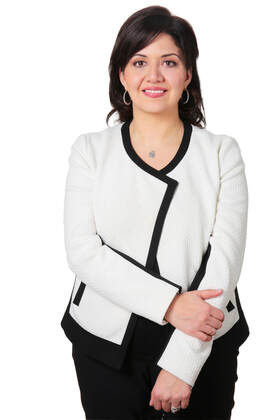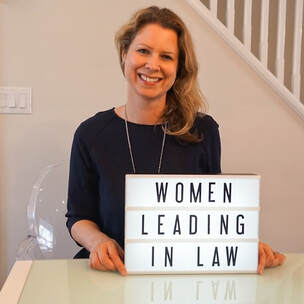 I hope you had a lovely long weekend. Ready for some more great career advice from a leading lawyer? Read on to read about Yola Ventresca's legal journey and some her helpful advice: 1. Tell me a little about your practice or business. I have a diversified, eclectic practice. In general terms, I would define it as a broad based administrative/litigation practice. I have had the good fortune of being able to shape a practice that reflects my passions – something that I value tremendously. My ability to do so was fostered and encouraged by my principals (and mentors): Peter Kryworuk, Shauna Powell and Kevin Ross. I was also lucky to have worked closely with Earl Cherniak in my early years. Earl told me: “do what you love, the files will follow.” That was – and is – invaluable advice that guides me constantly in everything I do. About half of my practice is devoted to health law. It was health law that brought me to Lerners in the first place. This includes primarily the representation of regulated health professionals confronting various issues including litigation, proceedings before their respective regulators (i.e. College of Physicians and Surgeons of Ontario, Royal College of Dental Surgeons of Ontario), privacy concerns, human rights proceedings and issues arising from hospital practice. I am part of a specialized team at Lerners that deals with issues related to medical assistance in dying, and, more recently, issues flowing from the COVID-19 pandemic. The balance of my practice involves various types of administrative and tribunal work. I have a robust practice focussed on post-secondary institutions. To this end, I provide advice to universities on a myriad of issues ranging from sexual violence to research ethics. I also have a significant labour practice focussed on post-secondary institutions. In addition, I am a certified workplace investigator, and, in this role, offer independent fact-finding services for various sectors. The rest of my practice consists of employment law, human rights law and appellate work. 2. Why did you go to law school? I should start by saying that it was not entirely a given that I would go to law school. After graduating from Huron University College at Western with an Honours BA, I was accepted into a graduate program in History and was seriously contemplating that route. However, the precarious nature of academic work ultimately led me to decide to go to law school (the dream of my five year old self, even though I had no lawyers in the family). So, I accepted an offer from the Faculty of Law at Western University. There, I had the incredible fortune of being mentored by some outstanding professors. The three that come to mind most vividly are Dr. Melanie Randall, Dr. Rande Kostal and Professor Robert Solomon. Professor Solomon’s course in Health Law was life-changing. I didn’t know what health law was before I started law school. Professor Solomon’s enthusiasm for the subject and his ability to push his students to reach beyond their grasp really inspired me. After finishing first in his health law class he suggested to me that I try to secure an articling position at Lerners. I remember vividly a conversation in his office on a Sunday afternoon in 2004 when he told me that in terms of health law, Lerners would always provide me with an intellectually challenging flow of health law files – and he was right. With letters of support from my mentors, I landed one of three available articling positions at Lerners that year. While one might think the rest was history, my love for academic work quietly followed me through my articling year at Lerners. So much so that at the end of the year, after much soul searching, I decided to apply for the full time LL.M. program at the University of Toronto. My husband was to be on sabbatical that year, and I could not pass up the opportunity to be a full-time student one last time. With funding offers from the Social Sciences and Humanities Research Council of Canada and the Canadian Institutes of Health Research, I advised Lerners I was withdrawing my name from consideration for hire back. We sold our home and packed our bags for Toronto. My year at the University of Toronto was intellectually stimulating and exciting. I entered the specialized Health Law and Policy LL.M. program. There, I again encountered inspiring mentors and health law “giants” including Dr. Rebecca Cook, Dr. Colleen Flood and Professor Joanna Erdman. I pinched myself almost everyday at my good fortune to be at the epi-centre of health law research. I was honoured to have my thesis supervised by Dr. Bernard Dickens, arguably Canada’s leading expert on medical law. As I neared the completion of my LL.M., I was encouraged by several of my mentors to pursue doctoral studies. After considerable soul searching and many long conversations, I decided that I wanted to practice law, and health law in particular. I was offered a job at Lerners in London after I completed my LL.M. It’s been my home for the past thirteen years. I will say that I have never lost my interest in, and commitment to, scholarly research and teaching. I’ve been lucky to be a part of a firm that supports my passion. I’ve published many articles in peer-reviewed journals and have taught at Western’s Faculty of Law. I feel that my scholarly work informs, sustains, and enriches my practice. 3. How did you get to where you are today? Design? Chance? Both? The short answer is that I worked hard. Really hard. And, as the old adage goes, luck is what happens when hard work meets opportunity. And that’s precisely what happened to me, with the assistance of some tremendous mentors and sponsors. I was raised with a very strong work ethic. I come from a big, Lebanese family. My father left Lebanon in the 1970s with eighty dollars in his pocket. My mother, who left Lebanon when she was six, was raised by her mother in precarious socio-economic conditions. My parents eventually became teachers (my mother would later become a school principal). I think understanding (and seeing) the tremendous sacrifices they made for their children propelled me forward. Getting an education, gaining a profession – these were a given growing up. I worked as a waitress and bartender during my undergraduate and law school studies, sometimes working up to thirty hours a week. This forced me to be organized and disciplined with my time. Working in the service industry imparted in me all kinds of skills which, at the time, I had no idea would assist in a legal career. Things like really listening to someone, picking up on non-verbal cues, diffusing tense situations, working late nights. I carried those lessons, and the lessons of my childhood, into the practice of law. 4. What is your most significant achievement? What are you proud of? While I have been honoured to receive a number of external distinctions (Lexpert Rising Star, rankings in Best Lawyers in Canada and the Lexpert Legal Directory), my most significant professional achievement was being a named an equity partner in December 2015; eleven months after I returned from parental leave following the birth of my daughter in August 2014. The journey to parenthood was a difficult one for me. My daughter arrived in my sixth full year of practice. By that time, I was a non-equity partner. Having been focussed on myself and my career for so long, I was petrified that I would find my parental leave difficult, that I would miss my files and my work. But I didn’t. In fact, I loved my leave (I say this knowing it is not so for many women and many, many, struggle tremendously). I loved it so much that when my six month leave was almost up, I started to have doubts about going back (or going back so soon). I remember taking my daughter to a lunch at the mall with our former managing partner and one of the great mentors of my life and career, Janet Stewart, Q.C. Eating my salad while rocking my almost six-month old daughter in her stroller, I told Janet that I didn’t know that I was ready; that I was losing sleep about going back to work so soon and that I would really like to just stay in my stretchy clothes for another six months. Looking me straight in the eye Janet said: “Yola, just give it a try; come back. If you come back and you need more time, we’ll give it to you, no questions asked.” If all of this had been playing out on film, a lighting bolt would have hit the protagonist at this point (me). With those few words of reassurance, and the knowledge that I could change my mind, I went back to work in February of 2015. Much to my surprise, having a child transformed the way I practiced. I worked smarter, more efficiently, learned to prioritize my time and got good at saying no. As each day passed, I felt more comfortable; I knew that I could be a good parent and a good lawyer. And that gave me confidence. Confidence for what my husband would jokingly refer to as the last 100 metre sprint to the finish line. I realized that equity partnership would do so much, not only for me, but for my family. So, I pushed through that last and hardest sprint. Being voted into the partnership the same year I returned to practice is something that will always bring me pride. I am most proud of myself for having found that extra gear; for just putting one foot in front of the other to achieve a long-cherished professional and personal goal. For not stopping. 5. What are some key challenges, and more importantly, opportunities for women in law? There is no doubt in my mind that private practice, to a significant extent, remains based on anachronistic views of family life from fifty or more years ago. It is premised on there being two partners in the home – one bound and one “un-bound”. In this paradigm, the “un-bound” partner, almost always the man (in heterosexual relationships), has limitless flexibility. He is able to take a 7am breakfast meeting because someone else is getting the kids ready for school; he does not hesitate to stay late at the office because someone else is tasked with the responsibility of school pick-up and homework oversight. He’s able to leave town on the drop of a dime, because the “domestic arena” is covered. Frankly, in my own life, I have the great benefit of having a partner who supports me (and has always supported me) in real and tangible ways. How? By taking on the lion’s share of the day-to-day work required to raise our daughter (while at the same time being an accomplished scholar, author, and educator). This was game changing for me. The empirical evidence regarding the attrition of women from private practice all points to one fact. It is not the having of children or the taking of parental leaves that makes many women feel that private practice and motherhood are not compatible. It is the early years of child-rearing and private practice that makes many (who want to stay in private practice) feel they have no choice but to leave. Now that I am in a position to assist others, most meaningfully as a mentor to junior lawyers, I am mindful of these hidden barriers in the domestic sphere. I offer as much flexibility as possible in terms of meeting times and calls. I try to mirror positive self-care behaviour, such as taking time for myself, putting boundaries around my personal engagements and saying no to office housework. I spend lots of time talking to my mentees about “making it all work” and that how “making it all work” sometimes means just getting through. I talk about when I’ve failed as much as I talk about when I’ve succeeded. I encourage them to think about the long game; the way that things change as one moves through the ranks of a law firm. I recognize that there are a myriad of other issues women face in law: pay inequity, sexual harassment and unrecognized/unpaid work. I had the opportunity to write a recurring column this past year for Advocacy Matters that addressed many of these issues. Part of my process was eliciting input for the various columns from female lawyers. My DMs were consistently flooded with stories from women talking about their experiences with sexual harassment, inappropriate prying into their personal lives, and being passed over for important files. We may like to think that the profession has dealt with these issues. We have not. Yes, there has been progress, but there remains a tremendous amount of work to do to address the systemic barriers that contribute to the under representation of women in the ranks of equity partnership and firm management. All that said, there is still so much good that should inspire us all. At Lerners in London, I would need well more than two hands to count the number of women at the equity partner rank who have families and thriving legal practices. There is a real culture of reaching behind you to pull up the next woman in line. Having been the beneficiary of this culture, I am doing my part now to reach out my hand. This means providing meaningful sponsorship, introduction to clients, work on high quality files, and pragmatic advice. 6. What advice would you give a woman starting her legal career? First and foremost, be honest with yourself. Do you enjoy the type of law you are practicing? If not, make the switch early. Find a firm with a culture of not only mentorship, but sponsorship. Try things before you think you are ready. Put your hand up for opportunities. Ask for opportunities. Be a trusted colleague. Always be professional with opposing counsel. Protect your reputation. Find a friend at work. Not just a colleague, a true friend. Someone who will support you, let you vent and have your back. And be that person for someone else. Take pride in your work. Think of yourself as an apprentice and soak up as much as you can. The early years go by in a blink. And, finally, but most importantly, remember that ours is a profession imbued with privilege and power. Stand up for people who are marginalized. Try your best to listen and understand. Lend your voice to the cause of equity and speak up when you see an injustice. Try to do your small part to move the profession toward a model where all feel included and respected. --------------------------------------------------------------------------- Wow! So much awesome advice in this one post. Thank you Yola for taking the time to provide such thoughtful, personal and valuable answers to these questions. I started this blog series because I was tired of hearing about women leaving law and wanted to hear about women leading in law. The "Women Leading in Law" series focuses on good news stories and highlights amazing women succeeding in the legal profession. Each post includes the profiled lawyer's answers to six questions. Prepare to be inspired! ICYMI - previous posts profiled the following amazing lawyers: Hilary Book, Margaret Waddell, Nandi Deterville, Jennifer Quaid, Maryann Besharat, Cynthia Mason, Roots Gadhia, Evelyn Ackah, Carrisa Tanzola, Sarah Leamon, Robin Parker, Lorin MacDonald, Karen Yamamoto, Victoria Crewe-Nelson, Lynne Vicars, Kemi Oduwole, Anne-Marie McElroy, Jennifer Gold, Jordana Goldlist, Megan Keenberg, Yadesha Satheaswaran, France Mahon, Sarah Molyneaux, Richa Sandill, Vivene Salmon, Kim Whaley, Alisia Grenville, Frances Wood, Maggie Wente, Anita Szigeti, Neha Chugh, Christy Allen & Nancy Houle, Suzie Seo, Kim Gale, Alexi Wood, Melissa McBain, Erin Best, Gillian Hnatiw, Melanie Sharman Rowand, Meg Chinelo Egbunonu, Lisa Jean Helps, Nathalie Godbout Q.C., Laurie Livingstone, Renatta Austin, Janis Criger, May Cheng, Nicole Chrolavicius, Charlene Theodore, Dyanoosh Youssefi, Shannon Salter, Bindu Cudjoe, Elliot Spears, Jessica Prince, Anu K. Sandhu, Claire Hatcher, Esi Codjoe, Kate Dewhirst, Jennifer Taylor, Rebecca Durcan, Atrisha Lewis, Vandana Sood, Kathryn Manning, Kim Hawkins, Kyla Lee, and Eva Chan.
0 Comments
Your comment will be posted after it is approved.
Leave a Reply. |
Erin C. Cowling is a former freelance lawyer, entrepreneur, business and career consultant, speaker, writer and CEO and Founder of Flex Legal Network Inc., a network of freelance lawyers.
Categories
All
Archives
June 2024
|
|
(C) 2014-2024 Cowling Legal. All rights reserved.
|
Please note I am not currently practicing law.
Information on this website does not constitute legal advice and is for informational purposes only. Accessing or using this website does not create a solicitor-client relationship. See website Terms of Use/Privacy Policy. |







 RSS Feed
RSS Feed
